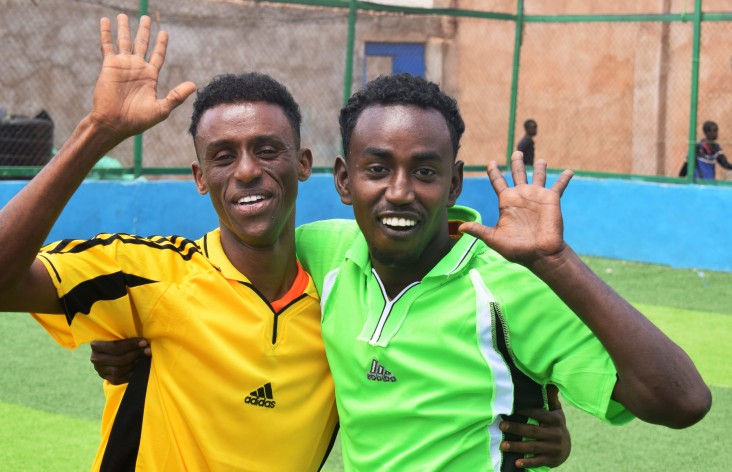Speeches Shim

November 2017—Najib* and Abdullahi come from BeletHawa, a village in the Gedo state of Somalia, where sub-clans have existed uneasily alongside each other for many years. Relations between clans in this small village are so strained that even basic social interactions are limited. Stuck in a cycle of violence over scarce resources, Najib and Abdullahi never interacted—until recently.
In less than a year, USAID’s conflict mitigation and management program called Somalis Harmonizing Inter-Intra Communal Relationships has brought together more than 1,000 youth in BeletHawa and three other communities along the Somalia-Kenya border to teach them new ways to resolve their conflicts and build cross-clan friendships.
Project-trained coaches infuse sports drills with practical approaches to handling conflict and teach the youth skills to help them successfully navigate everyday interactions in respectful ways.
“After participating in the sports drills, I have come to value the friendship I have with Abdullahi—even more than with my own clansmen,” explains Najib.
Originally developed by the German Corp. for International Cooperation, the exercises initially appear to be a set of standard soccer drills. Once players are on the field, however, the games teach an array of lessons on fairness, resource sharing in communities, and inclusion, which strengthen community resilience and lead to self-reflection.
One example is the “catch as you can” drill, where players are instructed to touch as many players as possible without being caught. Once touched, the players leave the game until all players are off the field.
Najib relates this game to violence spreading in his community. “Problems can start with one person and affect everyone else in the village,” he says.
Not long after a sports drill, one of Najib’s relatives stabbed a member of Abdullahi’s clan. After the victim was taken to the hospital, both clans began arming themselves in anticipation of revenge. In the past, such disputes would have escalated to armed violence—which could have engulfed Najib and Abdullahi. Resolution of such disputes would have been handled by older members of their sub-clans.
But this time, the young men approached their close relatives and, using their new skills, successfully persuaded their clan elders to prevent escalation of the conflict. A compromise was reached: Najib’s clan would cover the victim’s medical expenses.
The USAID project, which runs from October 2016 to September 2018, promotes broad, peaceful Somali engagement through social reconciliation activities. Over the last year, 48 trauma healing sessions were conducted with 480 community leaders that included 240 women and female youth. Another 2,300 participants (including 1,200 women and female youth) from divided factions have been brought together through traditional and cultural events. They are now better prepared to serve as leaders and peacebuilders in their villages.
*Last names not available.
LINKS
Follow @USAIDSomalia, on Facebook, on YouTube

Comment
Make a general inquiry or suggest an improvement.